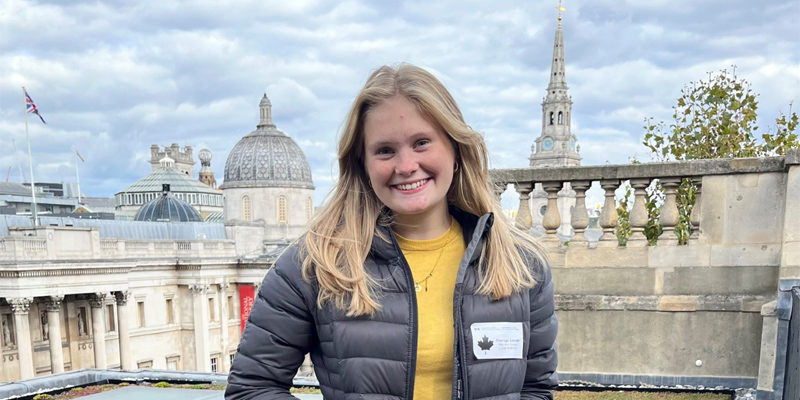Supporting startups

The first in a series of six student accounts of their commerce program work terms based at Harlow Campus.
I’m currently on my second work term for my bachelor of commerce (co-operative) degree but this time around, it’s a little different.
Five other Faculty of Business Administration commerce students and I are currently working remotely for Newfoundland and Labrador-based, med-tech startup companies from Memorial’s Harlow Campus in England.
Everything about this experience is new for us: from living away from home to learning medical terminology to working for new and upcoming companies.
The work placement is unique and has led to many unforgettable experiences.
Before starting this job, I had never left North America before or lived outside my childhood bedroom, let alone tried to find opportunities for startup companies to expand to markets in the U.K.
However, I built a strong connection with my assigned company, Luxsonic Technologies, a virtual reality-based radiology reading room, right off the bat.
It was nice to have a warm welcome from every team member and they said that every little bit of work and research I can do helps.
It was a type of reassurance and contentment I had never felt in a job before.
“Being able to witness passionate people with brilliant ideas succeed and change the medical world is a pleasure.”
To think that I, an undergraduate student, was helping promote a new product that could change the world of radiology is a thought I still haven’t gotten quite used to, but is such a great feeling.
Med-tech is something that will absolutely change the world of medicine for the better.
Doctors, nurses, physicians and other employees in the medical industry face challenges on a daily basis.
Of course, some products would be regionally specific to an ongoing problem, but others can be suitable globally.
A real-life example of this would be when Mike Wesolowski, co-founder and CEO of Luxsonic Technologies, founded the idea of SieVRt.
Being an academic working in radiology, he noticed the workflow and work-life balance of radiologists were negatively impacted by the lack of flexibility in work spaces, as they are restricted to working in a compact room when completing diagnoses.
To help address this global issue, Mr. Wesolowski and his team created a virtual reality-based radiology reading room, making it possible for radiologists to do their work from anywhere with an internet connection.
Being a part of a med-tech startup is empowering. Being able to witness passionate people with brilliant ideas succeed and change the medical world is a pleasure.
Understanding the differences between what could be applicable in the U.K. versus Canada varies from product to product.
A lot of research on the U.K. medical market, its wants and needs, and keeping up with the news on a daily basis, has been crucial to understanding what potential buyers respond to.
The amount of effort and drive it takes to create a startup is out of this world!
“Taking “no” as a learning experience is something that takes a lot of getting used to.”
Even if my future doesn’t line up for me to create my own startup, the motivation, confidence and drive I have seen on this exchange is enough for me to take that mindset to any career path.
Hearing “yes” as an exciting new opportunity and taking “no” as a learning experience is something that takes a lot of getting used to, but seeing it happen on a day-to-day basis with a positive mindset is inspiring.
This opportunity abroad has been something that I will take with me for the rest of my life — not only in the way of a career path, but also how to stick to something you are passionate about, no matter the roadblocks ahead.
Harlow Campus is positioned in the U.K.’s Innovation Corridor, a leading sci-tech region between Cambridge and London.
The Supporting Startups series will run Monday-Wednesday-Friday until Dec. 14.